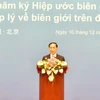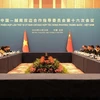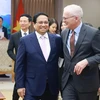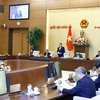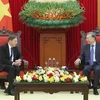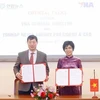The 11 th Anti-Corruption Dialogue, themed “Anti-Corruption Work in Locality: Reality & Solutions”, took place in Hanoi on December 6.
The event was jointly held by the Government Inspectorate, the Office of the Central Steering Committee for Anti-Corruption (OSCA), the UK Department of International Development and the UK Embassy in Vietnam .
Speaking at the event, Deputy Prime Minister Nguyen Xuan Phuc stated that corruption has become a global challenge regardless of geographical position, political system and development standard.
Corruption prevention is a long-term fight that requires all countries to cooperate, he said, adding that all levels of the Vietnamese Government and authorities affirm their determination to tackle the evil.
According to Phuc, over the last year Vietnam has taken many measures to assess anti-corruption work. Through them, the reality of corruption prevention, especially shortcomings and weaknesses, has been drawn out, laying foundations for the Vietnamese Party and State to decide on important policies and solutions in the coming time.
This is the first time anti-corruption work in localities has been put on the table, so the dialogue should focus on clarifying the reality, particularly shortcomings, enabling specific solutions for each locality, he said.
UK Ambassador to Vietnam Antony Stokes said that in 2012, Vietnam made three great developments: the revision of the Anti-Corruption Law, the analysis, research and publication of reports on corruption prevention, and the commitment of local leaders to actions against corruption.
However, corruption in Vietnam remains serious, he noted, suggesting closer coordination and cooperation in anti-corruption measures.
Local leaders should take stronger actions against corruption, especially in the public sector, he said.
According to OSCA, with determination from the whole political system, the efforts of authorised agencies, organisations and mass media, and the important role of the people, anti-corruption work in Vietnam has seen positive developments, with the comprehensive direction of leaders and the increase of anti-corruption measures.
The responsibility of society in the work has been strongly promoted. The efficiency of detecting and handling corruption acts has been improved, while attention to international cooperation and the enforcement of the UN Convention on Corruption Prevention has increased.
Over the last five years, anti-corruption work in localities has seen remarkable changes. Corruption prevention measures have been implemented synchronously, especially in ensuring the transparency of State agencies’ activities and administrative reforms. In some fields, corruption has been controlled.
However, the work has failed to meet some set requirements and objectives. Publicity, transparency and democracy have been limited in some aspects, especially in land management and use, exploitation of natural resources and minerals, and budget collection and spending management. There has been a lack of strict measures to handle leaders’ responsibility when corruption has taken place.
Participants at the dialogue said that corruption exists with complicated signs in many areas and levels, causing public discontent. It remains a big challenge to the leadership of the Party and the management of the State.
Donors and development partners support the Vietnamese Government’s determination to push back corruption, they said.
To make the work more effective, delegates emphasised the need to improve the efficiency and effectiveness of inspection, examination, auditing, investigation, prosecution and judgment of acts of corruption.
It is necessary to increase the role and responsibility of leaders of agencies, organisations and units in anti-corruption work, strengthen the publicity and transparency of activities against corruption, as well as increase the supervision of organisations, people and media, they said.-VNA
The event was jointly held by the Government Inspectorate, the Office of the Central Steering Committee for Anti-Corruption (OSCA), the UK Department of International Development and the UK Embassy in Vietnam .
Speaking at the event, Deputy Prime Minister Nguyen Xuan Phuc stated that corruption has become a global challenge regardless of geographical position, political system and development standard.
Corruption prevention is a long-term fight that requires all countries to cooperate, he said, adding that all levels of the Vietnamese Government and authorities affirm their determination to tackle the evil.
According to Phuc, over the last year Vietnam has taken many measures to assess anti-corruption work. Through them, the reality of corruption prevention, especially shortcomings and weaknesses, has been drawn out, laying foundations for the Vietnamese Party and State to decide on important policies and solutions in the coming time.
This is the first time anti-corruption work in localities has been put on the table, so the dialogue should focus on clarifying the reality, particularly shortcomings, enabling specific solutions for each locality, he said.
UK Ambassador to Vietnam Antony Stokes said that in 2012, Vietnam made three great developments: the revision of the Anti-Corruption Law, the analysis, research and publication of reports on corruption prevention, and the commitment of local leaders to actions against corruption.
However, corruption in Vietnam remains serious, he noted, suggesting closer coordination and cooperation in anti-corruption measures.
Local leaders should take stronger actions against corruption, especially in the public sector, he said.
According to OSCA, with determination from the whole political system, the efforts of authorised agencies, organisations and mass media, and the important role of the people, anti-corruption work in Vietnam has seen positive developments, with the comprehensive direction of leaders and the increase of anti-corruption measures.
The responsibility of society in the work has been strongly promoted. The efficiency of detecting and handling corruption acts has been improved, while attention to international cooperation and the enforcement of the UN Convention on Corruption Prevention has increased.
Over the last five years, anti-corruption work in localities has seen remarkable changes. Corruption prevention measures have been implemented synchronously, especially in ensuring the transparency of State agencies’ activities and administrative reforms. In some fields, corruption has been controlled.
However, the work has failed to meet some set requirements and objectives. Publicity, transparency and democracy have been limited in some aspects, especially in land management and use, exploitation of natural resources and minerals, and budget collection and spending management. There has been a lack of strict measures to handle leaders’ responsibility when corruption has taken place.
Participants at the dialogue said that corruption exists with complicated signs in many areas and levels, causing public discontent. It remains a big challenge to the leadership of the Party and the management of the State.
Donors and development partners support the Vietnamese Government’s determination to push back corruption, they said.
To make the work more effective, delegates emphasised the need to improve the efficiency and effectiveness of inspection, examination, auditing, investigation, prosecution and judgment of acts of corruption.
It is necessary to increase the role and responsibility of leaders of agencies, organisations and units in anti-corruption work, strengthen the publicity and transparency of activities against corruption, as well as increase the supervision of organisations, people and media, they said.-VNA













